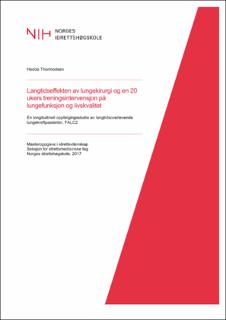| dc.description.abstract | Background: The number of lung cancer incidents is increasing, where 80-90% is due to cigarette smoking. Surgery is the best option for curing the patient, but may severely reduce the patient`s pulmonary function and quality of life (QOL). The knowledge about long-term development of pulmonary function and QOL is however absent in this patient population. The aim of this study was to look at the long-term effect of surgery regarding pulmonary function and QOL. In addition we investigated the long-term effect of a trainingintervention, on pulmonary function and QOL.
Method: Thirty-four (19 woman) 5-year non-small lung cancer survivors were included in a long-term follow-up after participation in a randomized controlled exercise training study. As prevously performed, spirometry (FEV1) and diffusion capacity of carbone monoxide (DLCO) were measured. Questionnaires regarding physical and mental QOL (SF-36) and anxiety and depression (HADS) were completed.
Results: Surgery led to a reduction in FEV1 and DLCO of 13% (p=0,01 and 19% (p=0,01) 4-6 weeks after surgery. After five years the pulmonary function were increased; FEV1 and DLCO only 9% (p=0,01) and 5 % (p=0,34) lower than preoperativevalues. No significant difference was found between the training-and the controlgroup at five-year follow-up (FEV1, p=0,95 and DLCO, p=0,66). After surgery the physical component summery score (PCS) and the mental component summery score (MCS) did not change (p=0,11 and p=0,99). After five years, the PCS is lower than preoperative levels while the MCS is higher, but not significant (p=0,26 and p=0,18). The patients have a low degree of anxiety and depression before surgery, and throughout the fiveyear follow-up. No significant difference was found between the training-and controlgroup after five years in PCS (p=0,25) or MCS (p=0,71). A moderate correlation between DLCO and MCS were found at the five-year follow-up (r=0,45).
Conclusion: Long-term lung-cancer survivors increase their pulmonary function gradually over time, however not back to preoperative values. The QOL does not change significantly throughout the follow-up. The training intervention did not have significant impact on pulmonary function or QOL in the long run. A moderate correlation between higher DLCO and better MCS was found. More long-term followups with a higher number of patients are needed to investigate these findings. | |
